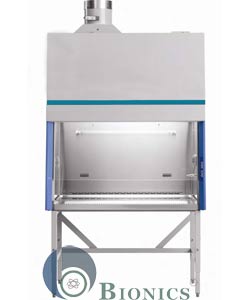Essential Things You Must Know on microbiological safety cabinet
Essential Things You Must Know on microbiological safety cabinet
Blog Article
Class 2 Biosafety Cabinets – Vital for Lab Safety and Biological Containment

Maintaining a safe lab environment is crucial in today’s advanced research and clinical setups. Whether it's biotech development, pharmaceutical research, or microbiological analysis, biosafety cabinets form the backbone of contamination control.
Among the available options, Class 2 Biosafety Cabinets stand out for their balanced protection. These units are crucial for working with moderate-risk organisms and sensitive samples.
Understanding Biosafety Cabinets
Biosafety cabinets are airflow-controlled workspaces engineered for microbiological safety. They use high-efficiency filters to purify air entering and leaving the cabinet.
These units are generally classified into Classes I, II, and III depending on airflow and application needs. Among these, Class II units strike a balance between user, product, and environmental protection.
Why Class II Cabinets Are the Preferred Choice in Labs
Class 2 Biosafety Cabinets are designed to safeguard three aspects: the operator, the sample, and the environment. They generate a vertical airflow that reduces turbulence and contamination.
Air is treated using dual filtration systems to ensure safe circulation and exhaust. These cabinets are frequently used in labs handling infectious agents or clinical samples.
What Makes Class 2 Cabinets Effective in Labs
A Class 2 microbiological safety cabinet includes several critical technologies such as:
• High-efficiency air filters to ensure clean workspace air
• Laminar airflow that minimises disruption and contamination
• Negative pressure barriers to prevent leakage
• Optional UV lights for overnight sterilisation
• Noise-reducing construction for better working conditions
• Transparent sash or viewing window for easy access and monitoring
These elements support lab workers in maintaining sterile working environments.
Applications in Research and Healthcare
Class 2 Biosafety Cabinets are key equipment in healthcare, molecular biology, and quality control. They are critical for DNA/RNA extraction, pathogen culture, and molecular assays.
Hospitals, research labs, and manufacturing units depend on these cabinets for contamination control.
Why Laboratories Prefer Class II Safety Cabinets
Using Class 2 cabinets offers multiple advantages including operator protection and experimental reliability:
• Prevents contamination during sensitive procedures
• Acts as a barrier between user and biohazard
• Ensures filtered air is safe for release or recirculation
These cabinets combine safety features with operational efficiency.
Regulatory Standards for Class 2 Cabinets
Top manufacturers ensure their cabinets meet certifications like NSF 49, EN 12469, and WHO recommendations. Class 2 units are sub-classified as A1, A2, B1, and B2—with each type offering different air handling systems.
• Type A2: Recirculates 70% and exhausts 30% of filtered air
• Type B2: Suited for labs dealing with toxic agents
Selecting the right configuration ensures compliance and safety.
How to Select a Class 2 Safety Cabinet
Before purchasing, consider:
• Your application type microbiological safety cabinet (e.g., diagnostics, pharma, research)
• Cabinet dimensions, ducting needs, and room layout
• Energy consumption and maintenance frequency
• Warranty, training, and certification services
Consulting with experts ensures the cabinet fits both budget and compliance goals.
Safe Setup and Operation of Class 2 Cabinets
For optimal results:
• Minimise airflow interference during operation
• Schedule regular performance checks
• Train users in proper techniques and precautions
Operational best practices include:
• Use gloves, gowns, and face shields while operating
• Work calmly to prevent airflow disturbances
• Wipe work areas with disinfectants regularly
• Never activate UV when humans are present
Conclusion
Class 2 biosafety cabinets are a cornerstone of any safe, efficient laboratory. They ensure contamination-free experiments and personnel safety.
From biotech and diagnostics to academia and pharma, Class II cabinets copyright the highest biosafety levels. When investing in a biosafety cabinet, opt for trusted brands that offer end-to-end service—because safe science starts with smart containment. Report this page